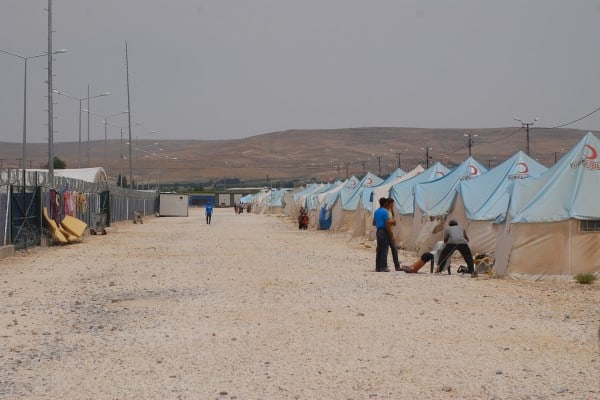This page contains affiliate links. This means if you a follow a link and make a purchase, at no additional cost to you, Humanitarian Careers will receive a commission. Thank you for supporting the site.
Working in international development can be a fantastic career. You get to use your skills and experience to address global challenges and assist in reducing inequality around the world. However, starting your career in international development can be difficult. The development sector is competitive, especially early in your career when you have less experience in international development work. With that said, there are several things you can do to help you get started in your career in international development.
Get a Master’s Degree
The first step in starting your career in international development is getting a masters degree. Many jobs in international development include having a masters degree in their required criteria. Although it is possible to enter the development sector with only a bachelor’s degree, having only an undergraduate will limit the jobs you can apply for.
Having a master’s degree is a good way to start your international development career as it opens up more job opportunities early in your career.
When starting your development career and choosing a masters you can either choose a broad development studies masters or a masters in a technical area such as economic or community development. There are advantages to both. Starting your career with a masters in international development allows you to apply for entry-level jobs more widely.
However, having a specialised masters narrows your options but increases your chances when applying for roles in your specific area of development as these jobs are only open to those with the required technical qualifications.
Do Training Courses
A next key stage to starting your career in international development is to take training courses. The development sector has many providers who offer trainings online and in-person. Many of these trainings are free and they are a great way to gain additional knowledge of international development. Doing additional training courses helps you start your career in development as you can gain knowledge of a wide range of specific areas within international development.
Doing training courses in addition to your master’s degree is a strong way to start your career in international development. Early in your career you have less work experience, and so doing training courses can be a way to gain additional knowledge and expertise before you gain professional experience.
Completing trainings, either online or taught, is also a great way to start your career in development as it shows you employers your commitment to the industry.
International Development Online Courses
If you are looking to work in international development, taking an online short course can be a great way to boost your CV. We highly recommend the course Management of International Development: Towards Agenda 2030. It looks at the current international development model as well as the trends that will be key to global development in the near future. Follow the link to the course’s page for more information.
We also think the online course Sustainable Development in the 21st Century by Yonsei University to be one of the best for those interested in international development. Delivered by former UN Secretary General Ban-ki Moon, the online course would be a great addition to the CV of anyone looking to work in international development. The link is to the course’s page.
If you are interested in the practical methods used on international development projects, we recommend the online course How To Design & Fund International Development NGO Projects. The course teaches students the tools needed to establish and run impactful development projects. Click the link to visit the course’s page for more information.
Volunteer (But in The Right Way)
The international development sector is competitive and beginning your career can be a challenge. The key is to start getting practical experience. A good way to do this is with volunteering.
However, although there are many organisations that will take you abroad to volunteer on development projects, the international development sector is turning away from ‘volu-tourism’ as more attention is paid to often negative impacts this can have on developing communities.
Although starting your international development career with overseas volunteering can be good, if you go with reputable volunteering organisations such as Peace Corps or VSO, going with some more ‘amateur’ volunteering companies may cost you money and actually be viewed negatively by development agencies. A great alternative is to volunteer in your home country.
Many cities have local NGOs working with refugees who have settled there and volunteering with them can be a great way to start your career in international development.
Maybe Do an Internship
Another good way to start to your career in international development is to do an internship. Many large and small international development agencies offer internship programmes to students and recent graduates as a way for them to gain practical experience in the development sector at the start of their career.
Beginning your international development career with an internship can be a good way to build experience within an NGO and can assist with moving onto further roles as with them as your career progresses.
Although internships can be a great way to begin your international development career, you definitely don’t have to start your development career with one.
Many development NGO’s will take entry-level candidates without them having done an internship.
Good volunteering experience, that can be done part-time whilst studying or working outside the sector, as well as a good masters and trainings can offset not doing an internship as a way to start your international development career.
Send a Lot of Applications
The international development sector is competitive, and sadly it can be hard to get your career started. An important thing to remember, especially at the beginning of your development career, is you need to send a lot of applications, and I mean a lot!
Sending lots of applicants can offset the competition by giving you more chances to be short-listed for interviews, and more interviews to succeed in and get the job.
At the start of your career in international development you will need to send a lot of applications to get your first jobs. Your applications should also be tailor-written for each job, so create a system that allows you to change key parts of your CV and cover letter to each application to speed up the process. Also, at the beginning of your career, don’t be too picky about what development agencies and jobs you apply for.
Send a lot of application and see your first roles in international development as stepping-stones to where you want to get to.
Targeting the Right NGOs Can Help
All international development NGOs have entry-level roles and to begin your career you should definitely apply to any. However, there are some NGO’s more known for taking people earlier in their career and it is good to target these when starting out your career in development.
Generally, smaller and medium sized international development NGOs are good for starting out your career. Some good international development NGOs to target early in your career include:
- ACTED
- Solidarites International
- Overseas Development Institute
- INTERSOS
- Premiere Urgence Internationale
- Triangle
- CESVI
There are also some international development NGOs known for taking people with more experience. These include:
- International Rescue Committee
- Save the Children
- Medecins du Monde
- CARE International
- Danish Refugee Council
- Norwegian Refugee Council
- International Medical Corps
The above lists are just a guide, so be sure to check a lot of different international development NGOs to see which are hiring roles suitable for starting your career. Although targeting the right NGOs can help at the beginning of your development career, sending more applications and continuing to do online training and volunteering is more important.
Perhaps Specialise in a Technical Area
One option at the beginning of your international development career is to specialise in a technical area. The development sector splits roles into generalist roles, such as managers, coordinators, grants, finance, logistics and HR; and technical roles, such as health, nutrition, water and sanitation and education.
Technical roles require specific qualifications and experience, but if you have these it can mean it is easier to find jobs in the technical fields at the start of your career, as fewer people have the technical qualifications needed.
Although specialising in a technical area can make starting your international development career easier in some ways, it can also give you less roles to apply for.
Remaining a generalist within the international development sector allows you to move more easily between positions, which can also help at the start of your career, but also means there is more competition, especially for entry-level roles.
Maybe Learn a Language
It is definitely true that speaking a second language will help you in your international development career, especially at the beginning. Generally speaking, English and another core language – French, Arabic or Spanish will open more roles to you.
It can also be beneficial to your development career to speak a language that is needed in the field – such as Urdu, Farsi or Bengali. For sure speaking a second language will help your international development career, especially at the start.
Although speaking a second language relevant to the development sector can help you, especially early in your career in international development, it’s important to question whether learning a new language is a good return on the time investment. If you already speak a second language, fantastic, you will probably reap the rewards. However, if you don’t, and you would need to learn one, the time spent getting to a working level could perhaps be best used doing volunteer work or training courses?

Be Flexible
At the beginning of your international development career, you need to be flexible. As the international development sector is competitive, at the start of your career you have less experience and therefore less options.
Being flexible in which development NGOs you work for, where you work and the type of role you do will allow you to gain early experience in your career that you can then build on to move in the career direction you want to go.
As said before, when you start your career in international development you should see opportunities as stepping stones that you can use to get to the jobs you most want. Don’t hold out for the ideal role with the development NGO you are most passionate about early in your career. This will limit your options and make getting your career off the ground much harder.
Flexibility at the start of your career will give you a wide range of experiences in the development sector and these can be used to move into the job you most want.
Be Willing to Travel (Sometimes Suddenly)
Traveling overseas is a key part of international development work. The travel is usually one the reasons people want to work in development. However, early in your career you need to be willing to travel to places that aren’t your first choice of work destination, and may not be easy places to be.
International development NGOs often struggle to recruit for certain work stations in tougher environments and so when starting your career, you need to be willing to travel to the places more experienced people can avoid.
When starting your career in international development you also need to be flexible with your travel. Often opportunities arise suddenly and international development NGOs fill gaps with less experienced people. At the beginning of your career, you should be willing to travel suddenly and this may have an impact on your personal life.
However, being available when a development NGO urgently needs someone in the field can be a great way to get a boost at the beginning of your international development career.
Network (But Not in The Way You’re Told)
It is commonly said that especially in the early stages of your international development career you need to network. It’s also said that at the start of your career you should seek to build a network to find jobs. Actually, all reputable development NGOs hire their staff through open advertisements and, although it may have been the case the few years ago, starting your career by having a job handed to you through your network just isn’t the way it’s done now.
With that said, it doesn’t mean networking cannot be an important part of starting your international development career.
The best use of your network at the start your career in development is to get good information on how the NGOs you are applying to work, what they look for candidates and inside knowledge of their on-going development projects. This kind of information can be really useful at interviews and make you stand out against other candidates also at the start of their careers in international development.
Get IT Skills (Especially in Excel)
Like all modern work sectors, the international development industry needs staff who are IT competent. For some technical roles this may mean knowing specific software, however, for general roles the development sector the most important IT skills to have are in Microsoft Office. It may sound obvious, but gaining strong skills in Word, Excel, PowerPoint and Outlook are crucial to getting a good start in the international development sector.
Generally, through study and work you are likely to pick-up a good understanding of Word and PowerPoint, the most important place to put your energy at the start of your international development career is in Excel.
Having an intermediate understanding of Excel is crucial to almost all jobs in the international development sector and for many jobs you will have you pass an Excel test when you apply. At the beginning of your international development career, definitely spend time getting a good at Excel.
Be Determined
Sadly, it’s worth repeating that the international development sector is competitive, especially at the beginning of your career. However, when starting our in international development its important to stay determined. Keep going!
Complete your masters, do as many trainings as you can, apply for lots of jobs and it will happen. Its good to remember the international development sector is large, and there are jobs out there for people starting their career, just stay determined to get yours!
It can take several years to get your first international development job at the beginning of your career and this can definitely be dis-heartening. However, as you gain more experience in the development sector and build your career, jobs become easier to get and the sector begins to feel a bit less brutal.
At the start of your career just stay determined and remember why you want to do this line of work. Keep your passion and don’t let-up until you’ve fully began your career in international development.






